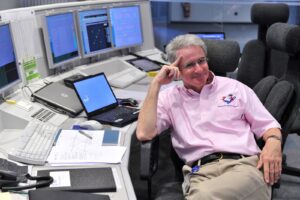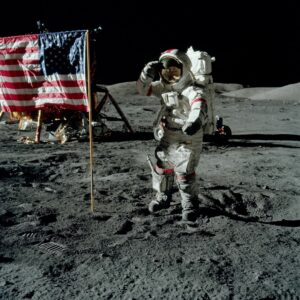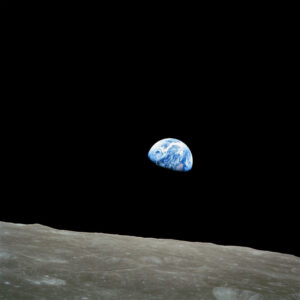by Paolo Ferri

I was born in September 1959, so I belong to that lucky generation that witnessed the Moon landing around the magical age of 10. If big events make a strong, indelible mark in the brain of a ten years old kid, one can imagine the effect that such an incredible, unique, historical event had on our childhood. I remember following the Apollo programme starting with the first orbital mission, Apollo 7 in the autumn 1968. From that moment on I was absorbing anything that made a reference to the Moon race. Collecting newspaper article, watching TV news, making drawing myself on dozens of Apollo and Soyuz capsule circling the Earth and the Moon, even keeping a diary that, alas, I have in the meantime lost. It was a dream of a child that was coming true in front of my eyes, fixed on the TV screen on that night on 20 July 1969.
In the following years I watched the other Moon landings, acknowledging with satisfaction the promises of the next steps that would be coming soon: regular journeys to Moon, a permanently inhabited base on the surface, even a human landing on Mars by 1985. My confidence in Progress was growing solid and indestructible, and the human adventure in space was the concrete realization of it.

But soon came the years of the great disillusion. Politics lost interest in the space activities, citizen lost interest too, the energy crisis shook the world, Moon and Mars were forgotten, plans to continue the adventure abandoned.
Like Oliver Morton writes in his book The Moon: “It is not that nothing happened […]. But it was never enough for the people sometimes called orphans of Apollo – the children of the late 1960s for whom space remains an inspiration and a disappointment.”
For us it was too late to change our imprinted dreams. We persisted in our beliefs, we studied science or engineering, pursued a career in universities, space industry or national space agencies. We contributed to the evolution of technology and science that allowed the continuation of space activities. But Apollo was gone, forever, and with it the Moon.
Today, half a century later and at the end of our space careers, we have seen a reborn interest in the Moon. Inexplicably, that grey and boring celestial object that only reminds us of its existence because it persists in regularly appearing above us in the night skies, has become again an object of interest in the world around us. Interest that is political and scientific, like fifty years ago, but also, amazingly, commercial. Investors are putting money and their bets into new start-up companies that promise to send spacecraft to land on the Moon and perform all sort of economically profitable activities. China is steadily progressing on its successful robotic Moon programme, and announced that they will be landing human beings to the surface of our satellite within a few years. NASA of course could not anymore remain on the side, and established a new, majestic programme, called Artemis, to bring back Americans to the surface of the Moon.

How do we, orphans of Apollo, see this reborn Moon interest? Our feelings are mixed. Of course, we are excited, we follow all steps of this new space adventure with extreme attention and interest, if not anymore with the eyes of the enthusiastic children we were, certainly with both the confidence and the critical view of our long experience in space activities. But we also strongly feel that all this is happening half a century too late. We were there, we had landed twelve human beings on the surface of the Moon more than fifty years ago. Why didn’t we continue? Why did we suspend our dreams for such a long time, to the extent that today we have to start almost from scratch before even getting to the point we had reached then? Why did we have to wait so long, while we measured out our lives in parallel, interesting, yes, but different, activities? Our professional lives are getting to their end, and our physical lives, soon, too. Many of us will probably still be lucky enough to see men and this time also women walking again on the Moon. Some of us will even have the luck to see a continuation of the adventure beyond the pure repetition of a couple of landings – although it is difficult for us to be confident about that, after the big disillusion we experienced in our childhood.
When I am asked about my feelings about the Artemis programme, I reply that I feel the same as being invited to the wedding of a former girlfriend: I am very happy for her, but also a bit sad, because she is not marrying me, after all. I have been betrayed by the post-Apollo years: there is nothing Artemis can do today, half a century later, that can make up for that.
Better late than never? Yes, definitely, but it is not a great consolation, after spending almost a full life in waiting for this to happen.
2024-02 (submitted 12/11/2023)
